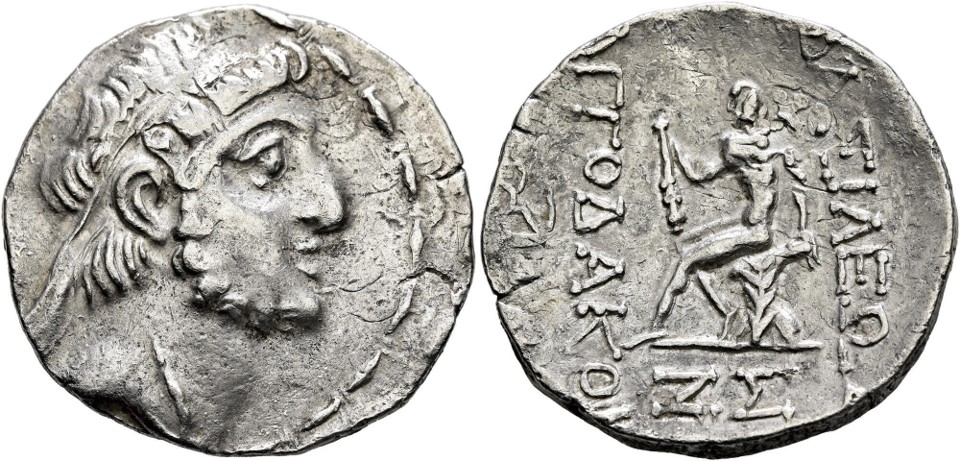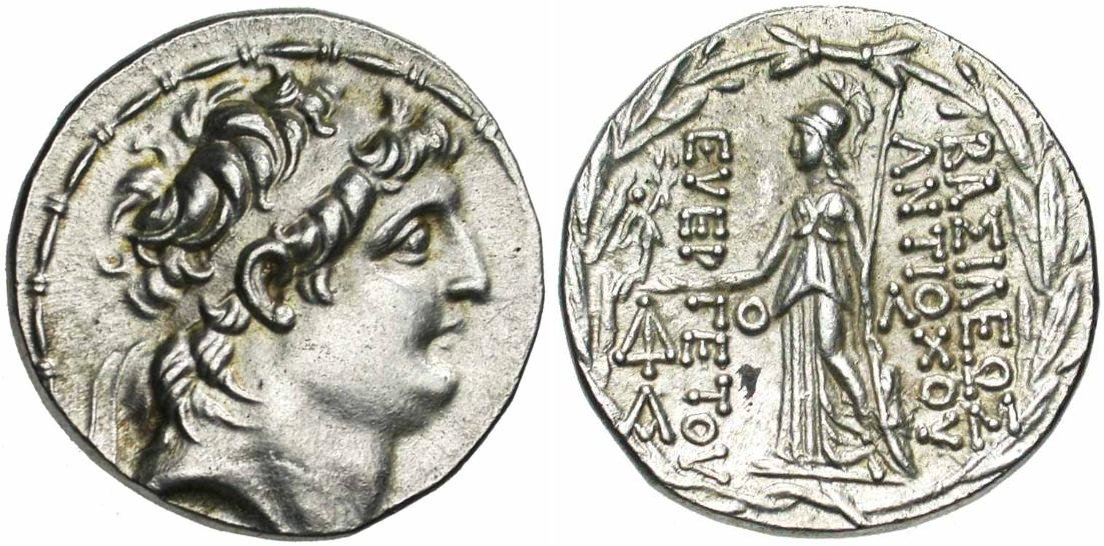106 BCE - 105 BCE | ΒΑΣΙΛΕΩΣ ΑΠΟΔΑΚΟΥ
Overstriking coin
Apodacus_Leu_Numismatik, _Web_Auction_26, _8_July_2023, _1745.jpg
[1]
Overstruck variety
Antiochus Evergetes O.jpg
[2]
|
|
Sale(s)Sale(s) ᵖ:
|
Leu Numismatik, Web Auction 26, 8 July 2023, 1745
|
| Private collection(s)Private collection(s) ᵖ:
|
"From a European collection, formed before 2005"
|
|
Description
| ObverseInscription or printing placed on the obverse.:
|
Male head right, wearing diadem. Bead-and-reel border.
|
ReverseInscription or printing placed on the reverse.:
|
ΒΑΣΙΛΕΩΣ ΑΠΟΔΑΚΟΥ (Greek) Heracles seated left on rock covered by Nemean lion skin, holding club on knee in right hand and resting left hand on rock face. In outer left, monogram. in exergue, ZΣ (year 207).
|
Mint and issuing power
Chronology
| FromIdentifies the initial date in a range assigned in a numismatic context. 106 BCE toIdentifies the final date in a range assigned in a numismatic context.. 105 BCE
|
Hellenistic 323-30 BC  periodTime period of the numismatic object. periodTime period of the numismatic object.
|
Physical description
MetalThe physical material (usually metal) from which an object is made.: Silver 
|
WeightWeight of the numismatic object (in grams). in grams: 16.1916.19 g <br />16,190 mg <br />
|
DenominationTerm indicating the value of a numismatic object. Examples: tetradrachm, chalkous, denarius.: tetradrachm 
|
AxisDescribes the directional relationship between the obverse and reverse of a numismatic object.: 1212 mm <br />1.2 cm <br />
|
| DiameterDescribes diameter of an object (in mm).: 3030 mm <br />3 cm <br />
|
StandardStandard.: Attic
|
References
Description
| ObverseInscription or printing placed on the obverse.:
|
Diademed head of Antiochus r.
|
ReverseInscription or printing placed on the reverse.:
|
BAΣΙΛΕΩΣ∕ ANTIOXOY/ EYEPΓETOY (Greek) Athena standing l. holding Nike and resting l. arm on shield, and holding spear with left, monograms in outer l. field
|
Mint and issuing power
Chronology
| FromIdentifies the initial date in a range assigned in a numismatic context. 138 BCE toIdentifies the final date in a range assigned in a numismatic context.. 129 BCE
|
Hellenistic 323-30 BC  periodTime period of the numismatic object. periodTime period of the numismatic object.
|
Physical description
| DenominationTerm indicating the value of a numismatic object. Examples: tetradrachm, chalkous, denarius. ᵖ:
|
tetradrachm 
|
StandardStandard. ᵖ:
|
Attic
|
References
| Frequency of overstrikesFrequency of overstrikes:
|
frequent
|
Level of confidenceLevel of confidence of the identification:
|
|
| RemarksRemarks:
|
"This coin was overstruck on a tetradrachm of the former overlords of Charakene, the Seleukids, as one can faintly read [...]TIOXOY across Herakles' head on the reverse. Which of the Seleukid kings named Antiochos the coin belonged to is difficult to say, but the most likely candicate is Antiochos IV, since the lines across Herakles' body likely derive from a seated Zeus figure, and the traces of the undertype on the obverse resemble his large portrait with curly hair. Another possibility would be Antiochos VIII, who was a near contemporary of Apodakos, but his coinage saw far less circulation in the East due to the collapse of Seleukid imperial control in the 140s and 130s BC, and his portrait is usually much smaller than that of Antiochos IV." (nb: not Antiochus IV and the Zeus aetophoros but Antiochus VII as elsewhere: see the lambda between the omikron of the legend and the hand of Athena)
|
References
- ^ Alram, Michael (1986), Iranisches Personennamenbuch. Band IV: Nomina Propria Iranica In Nummis, Vienna.
- ^ Houghton, Arthur - Lorber, Catharine C. - Hoover, Oliver D. (2008), Seleucid coins : a comprehensive catalogue. Part 2, Seleucus IV through Antiochus XIII, 2 v., New York - Lancaster - London, (xxx), 120 p. of plates : ill., maps, tables

